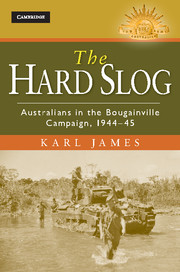Book contents
- Frontmatter
- Contents
- Maps
- Illustrations
- Abbreviations
- Acknowledgements
- Introduction
- Chapter 1 The unnecessary war
- Chapter 2 Torokina and the Outer Islands
- Chapter 3 The Central Sector
- Chapter 4 The Northern Sector
- Chapter 5 The Southern Sector
- Chapter 6 Slater's Knoll
- Chapter 7 To Buin
- Chapter 8 Peace
- Conclusion
- Notes
- Bibliography
- Index
Chapter 8 - Peace
Published online by Cambridge University Press: 05 July 2014
- Frontmatter
- Contents
- Maps
- Illustrations
- Abbreviations
- Acknowledgements
- Introduction
- Chapter 1 The unnecessary war
- Chapter 2 Torokina and the Outer Islands
- Chapter 3 The Central Sector
- Chapter 4 The Northern Sector
- Chapter 5 The Southern Sector
- Chapter 6 Slater's Knoll
- Chapter 7 To Buin
- Chapter 8 Peace
- Conclusion
- Notes
- Bibliography
- Index
Summary
WAR OVER – Hope the Nips find out soon
Watt, History of the 61st Australian Infantry Battalion, p. 235.When Germany surrendered in May 1945, there was little celebration or festivity on Bougainville. In most cases the news was received with indifference, even resentment. This was particularly true of the infantry, who knew the end of the European war would not affect their lives in the least. On 8 May the 57th/60th Battalion was patrolling around the Hari River in southern Bougainville and killed six Japanese in two ambushes. Corporal Harold Williams wrote in his diary: ‘WAR OVER IN EUROPE. I suppose most people are happy now [but] what does it mean to us up here?…Today was supposed to be a holiday.’ In the Central Sector, Colonel Dunkley noted that his 7th Battalion were all ‘very quiet about V(E) day’. It would be another three months before they heard the long-awaited news of peace in the Pacific.
On 8 August men huddling around wireless sets listened to radio broadcasts about the dropping of the atomic bomb on Hiroshima two days earlier. This saw a spate of betting on the date of Japan's surrender. The subsequent news of the atomic bombing of Nagasaki and the Soviet invasion of Manchuria added to the anticipation that the war was almost over. The 9th Battalion in Torokina began celebrating prematurely on 11 August, after hearing that the Japanese high command had unofficially accepted the Allies’ terms of surrender. The news broke at 12.30am with troops woken to ‘shouts of joy’, wrote the battalion's war diarist. Although ‘vague and unofficial’, the news was ‘accepted by every man that the fighting and bloodshed was nearing the last stages…For the greater part of the early morning, all lights in the area were burning and bedlam reigned supreme, mainly as an outlet to express the men's joy. During the height of celebrations, officers visited the company lines and indulged in a round of handshaking with the troops. After approx. four hours, the medley gradually lulled and most of the men retired physically exhausted.’
- Type
- Chapter
- Information
- The Hard SlogAustralians in the Bougainville Campaign, 1944–45, pp. 245 - 265Publisher: Cambridge University PressPrint publication year: 2012

